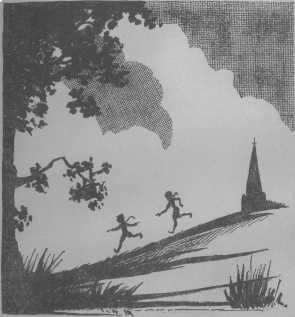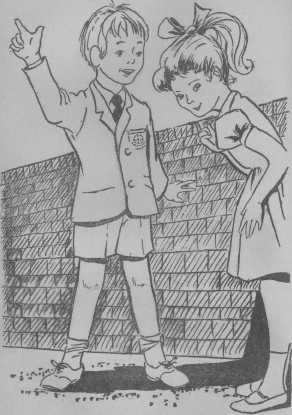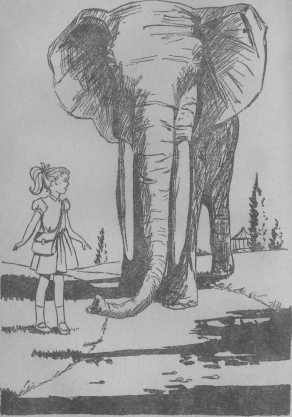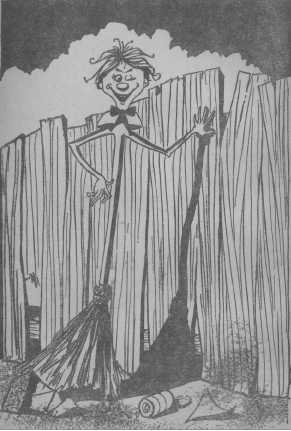Anytime Tales (7 page)

“A fight, a fight!” cried the boys, and came round. Leslie didn’t want to fight. He liked Peter. But his fists wouldn’t stop lashing out at him. Then the master came up and spoke sternly and sent Leslie indoors.
Leslie sat down, breathless. He was tired and frightened. He wished he had never asked the old woman for a spell.
School went on for the rest of the morning, and in geography Leslie drew six different maps, much to the astonishment of the teacher. He also learnt three pages of poetry, three times as much as any other boy. He simply couldn’t stop himself from working at top speed.
His legs raced him home for dinner, and his hands made him gobble again. His mother was alarmed.
“Leslie!” she said. “What has happened to you? Tell me, dear! It’s almost as if you are under a spell!”
“Oh, Mother, I am!” said poor Leslie. “I asked the old woman in the wood for a spell to make me quick instead of lazy and slow, and she gave me one, because
I did so badly want to earn that bicycle. But the spell’s too strong. Whatever am I to do?”
“I’ll take you to the old woman at once,” said his mother. “If she doesn’t take away the spell you’ll be tired out. Come along.”
So they went to the wood. His mother had to run all the way, because Leslie’s legs didn’t seem able to walk. The old woman laughed when she heard what the spell had been doing to Leslie.

“I’m sorry,” she said. “It only worked like that on a really lazy boy, one who has never in his life tried to be quick or punctual or hard-working. I didn’t think Leslie was as bad as that.”
“Please take the spell away,” begged poor Leslie. But the old woman couldn’t.
“You’ll have to put up with it for a day or two,” she said, “but if after that you yourself try to be quick and early and work hard, the spell will gradually die away. But if you get lazy again I’m afraid it will come back, and you’ll do everything at top speed, and annoy everyone, and get very tired.”
So Leslie put up with it for two days more, and then the spell seemed to die away. Leslie tried hard to be early for everything, and to work hard after that, and he found it wasn’t so difficult as it seemed. But, dear me, he had only to get lazy for a few minutes to start up that top-speed spell once more. You will be glad to know he got his bicycle!
Are you a lazy child? Tell your mother to let me know, and I’ll see if I can get a top-speed spell for you and cure you, too!
Look Out for the Elephant!
THERE’s an elephant loose!” shouted Jim, rushing into the school playground. “I just heard a man say so. It’s escaped from the circus.”
“Where is it, where is it?” cried all the children, rushing round Jim.
“It’s in the park—and they’re afraid it will trample down all the lovely flowers!’ said Jim.
“Oh, what a shame!” said Sara. She loved flowers,~~and she couldn’t bear to think of the elephant’s great feet trampling and breaking them all.
“They’ve sent for men with sticks,” said Jim
.
“They’ll scare that bad elephant properly, I wouldn’t mind chasing him myself.”
“But elephants are
nice,”
said Sara. “I rode on one heaps of times at the zoo. They are gentle and kind. They can’t help being big and having enormous feet. I think it’s horrid to send for men with sticks!”
“All right, then—you go and get the elephant out of the park!” said Jim scornfully. “Go on! See if it will come and eat out of your hand and follow you like a dog! I tell you, big sticks are the only thing to frighten an elephant!”

Sara stood listening to Jim. She was just about to tell him that an elephant
had
eaten out of her hand at the zoo when she had given him a bun—and then a grand idea came into her head!
Now when Sara had an idea she always acted on it at once. So she turned and ran into the school. She went to where the eleven-o’clock buns and milk were set ready for the children, and she put twelve of the buns into her school satchel!
You can guess what her idea was now, can’t you? Well, well—whoever would think of such a thing? Only Sara!
She ran out of the school gate and made for the park. It wasn’t very far away. There was a place in the hedge she could get through. She squeezed through it, and there she was in the park. Where was the elephant?
Well, he wasn’t very difficult to see, as you can imagine. There he stood, waving his enormous trunk to and fro, his great feet very near to a big bed of glorious dahlias.
In the distance Sara could hear shouting, and she guessed that men were coming with sticks.
“They’ll only scare him and he’ll go galloping over the dahlias,” thought Sara. “I’d better hurry.”
So she trotted down the path to where the big elephant stood. She went right up to him.
“You’re awfully like the elephant who gave me rides at the zoo,” she told him, and he looked down at her out of little, twinkling eyes. He flapped his ears and made a little trumpeting noise.

“Are you asking for a bun?” said Sara, and she put her hand in her satchel. “Well, here’s one.”
The elephant put out his trunk and took the bun. He swung his trunk up to his big mouth—and the bun was gone! He held out his trunk for another.
“Well, you can have all my buns if you come quietly down this path with me,” said Sara, “away from these lovely flower-beds. Your feet are so big, you know. Here you are, here’s another bun.”
She gave him another, and then began to walk down the path to the park-gate. The elephant, seeing that she had plenty more buns, followed her closely, trying to put his trunk inside the satchel.
Sara laughed. “Oh, you wait till I give you one! There you are. Now do come along. We’ll soon be at the gate.”
Well, well, well! The men with sticks stopped at once when they saw the elephant following little Sara like a dog.
“Look at that!” they said. “That kid has got old Jumbo eating out of her hand! Send his keeper to that park-gate—that will be the place to capture the elephant. He’s not scared any more, or angry. Well, would you believe it!”
Jumbo followed Sara all the way to the gate, eating the buns she gave him—and there at the gate was the elephant’s keeper waiting for him! Jumbo was very glad indeed to see him. He loved his keeper.
“Thank you, little girl,” said the keeper gratefully. “If it hadn’t been for you, poor old Jumbo would have been sent racing all over the flower-beds in fright, and
he might have done a lot of damage. Now—is there any reward you’d like for getting him to come quietly?”
“Well,” said Sara, “I suppose—I suppose I couldn’t ride on his head, could I, right past our school? The children would hardly believe it if they saw me there!”
“Yes. Old Jumbo will set you on his head and hold you there with his trunk,” said the keeper with a laugh. “Hup, Jumbo, hup!”
Jumbo picked up Sara very gently and set her on his big head. Then, holding her there with his trunk, he set off down the road that led past the school, swaying this way and that.
“Look! LOOK! It’s Sara up there!” shouted the children. “Hurrah for Sara! Sara, how did you get there? Oh, SARA!”
It was a lovely reward, wasn’t it? She deserved it, though, because she really did have a very good idea!
Benny and Mollie had both been naughty. They had been rude and disobedient, and their mother was very cross with them.
“You are not at all nice children lately,” she said. “You don’t try to help me in any way. I am very angry with you. You want a good punishment!”
Now their mother hardly ever punished them, so Benny and Mollie didn’t feel at all upset. They didn’t even say they were sorry.
“I’ve got to go out and do some shoppings” said Mother. “You two can really do some hard work for me for a change. You can take the big broom and sweep out the yard. It is full of bits and pieces, and I haven’t time to do it to-day.”
“Oh, Mother! We do hate sweeping,” said Benny sulkily. But Mother for once took no notice. She picked up her basket and went out to do her shopping.
The two children looked at one another sulkily. “You have first sweep,” said Mollie.
“That’s just like a girl!” said Benny. “No—you’re the bigger of us two. You begin first.”
“Benny! Don’t be mean!” cried Mollie, and she smacked her brother hard. Then, of course, there was a fine quarrel, and in the middle of it a queer old lady came by and watched from over the yard fence.
“What’s the matter?” she called. ”
The children stopped fighting for a moment and looked at the old woman.
“Our mother says we are to sweep the yard and we don’t want to,” said Benny. “It’s hard work. I think Mollie ought to begin as she’s the bigger one—and she says I ought to because I am a boy!”
“Dear, dear!” said the old lady. “Is it such hard work to sweep a little yard like this? Well, well—if you like to give me some pennies out of your moneybox, I will sell you a spell that will make the broom sweep the whole yard by itself.”
Well, you can guess that Benny and Mollie were surprised to hear that! A spell! What fun! They ran to get their money-boxes at once. Benny had fourpence in his and Mollie had fivepence in hers. Ninepence altogether.
They gave the pennies to the old woman. She picked up the broom and rubbed some yellow stuff on it, muttering some queer-sounding words as she did so. Then she smiled a funny smile, nodded her head, and went off down the road, her green eyes twinkling brightly.
The broom leaned against the fence. It grew a little head at the top and winked at Benny.
“Look at that, Mollie!” said Benny excitedly. “Hie, Broom—do your work. Sweep, sweep, sweep!”

The broom stood itself up. The little head nodded and grinned. It really was a very wicked-looking head! And then the broom began to sweep.
My word, how it swept that yard! It was marvellous! It swept it far, far better than the children would have done. Mollie and Benny were delighted.
“That’s right! Sweep up all the rubbish!” shouted Benny, dancing about for joy. It was such fun to see a broom sweeping all by itself with nobody holding it at all.
The broom began to whistle as it swept. The little head pursed up its funny lips and a queer little magic-sounding tune came from them in a whistle as clear as a blackbird’s.